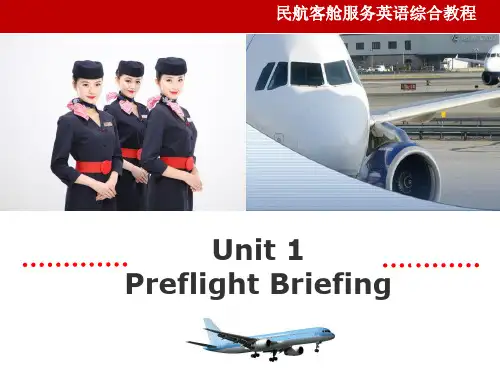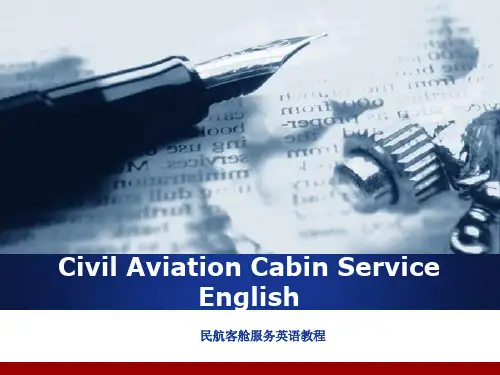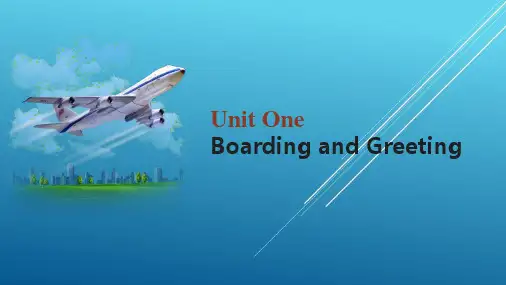民航客舱服务实用英语 Unit 1
- 格式:ppt
- 大小:2.17 MB
- 文档页数:8




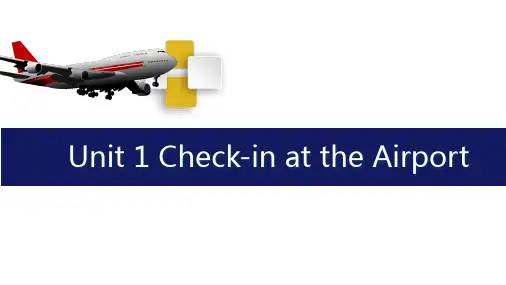
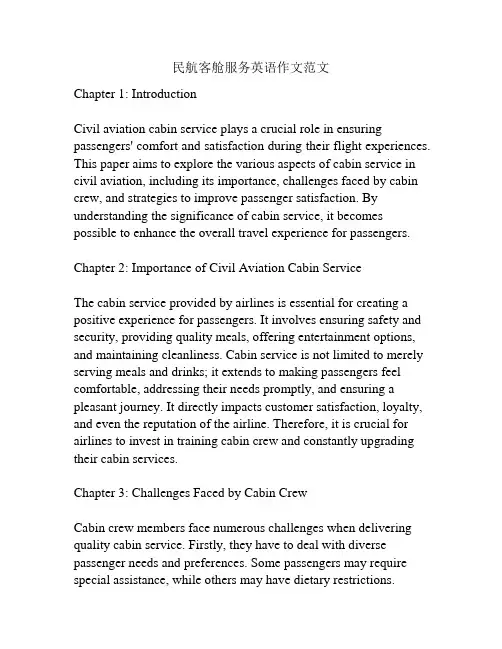
民航客舱服务英语作文范文Chapter 1: IntroductionCivil aviation cabin service plays a crucial role in ensuring passengers' comfort and satisfaction during their flight experiences. This paper aims to explore the various aspects of cabin service in civil aviation, including its importance, challenges faced by cabin crew, and strategies to improve passenger satisfaction. By understanding the significance of cabin service, it becomes possible to enhance the overall travel experience for passengers.Chapter 2: Importance of Civil Aviation Cabin ServiceThe cabin service provided by airlines is essential for creating a positive experience for passengers. It involves ensuring safety and security, providing quality meals, offering entertainment options, and maintaining cleanliness. Cabin service is not limited to merely serving meals and drinks; it extends to making passengers feel comfortable, addressing their needs promptly, and ensuring a pleasant journey. It directly impacts customer satisfaction, loyalty, and even the reputation of the airline. Therefore, it is crucial for airlines to invest in training cabin crew and constantly upgrading their cabin services.Chapter 3: Challenges Faced by Cabin CrewCabin crew members face numerous challenges when delivering quality cabin service. Firstly, they have to deal with diverse passenger needs and preferences. Some passengers may require special assistance, while others may have dietary restrictions.Additionally, cabin crew must manage conflicts among passengers and handle emergency situations effectively. Moreover, cabin crew often work long hours, deal with jet lag, and face challenging working conditions. All these factors make the job of cabin crew demanding and require them to possess excellent interpersonal and problem-solving skills.Chapter 4: Strategies to Improve Passenger SatisfactionTo enhance passenger satisfaction, airlines can implement several strategies. Firstly, airlines should ensure that their cabin crew members receive comprehensive training to enhance their service skills. This includes training in communication, conflict resolution, and emergency response. Secondly, airlines should regularly upgrade their onboard facilities to meet passengers' expectations. For example, providing comfortable seating, modern entertainment systems, and offering a variety of high-quality meals can significantly improve the overall travel experience. Lastly, airlines should take passenger feedback seriously and make necessary improvements based on suggestions received. This will demonstrate that the airline values its passengers' opinions and strive to enhance their experience.In conclusion, civil aviation cabin service plays an integral role in ensuring passengers' comfort and satisfaction during their travel experience. By understanding the importance of cabin service, exploring the challenges faced by cabin crew, and implementing strategies to improve passenger satisfaction, airlines can elevate the overall travel experience for passengers. This will result in increased customer loyalty and positive word-of-mouth, ultimatelybenefiting the airline's reputation.Chapter 5: Training and Development for Cabin CrewComprehensive training and development play a significant role in equipping cabin crew with the necessary skills and knowledge to provide excellent cabin service. Airlines should invest in implementing training programs that cover various aspects, including safety procedures, customer service, communication skills, and conflict resolution. These training programs should be conducted regularly to keep cabin crew updated with the latest industry standards and best practices.To ensure the effectiveness of training programs, airlines can use a combination of theoretical and practical training methods. Theoretical training can be conducted in classrooms or online platforms to provide cabin crew with the necessary knowledge about emergency procedures, regulatory requirements, and passenger service. Practical training can be conducted in simulated environments, such as mock cabins or emergency evacuation drills, to enhance cabin crew's ability to handle real-life situations efficiently.Additionally, airlines should focus on developing cabin crew's interpersonal skills. Effective communication and conflict resolution skills are crucial for cabin crew to address passenger needs, manage conflicts among passengers, and handle challenging situations. Training programs can include role-playing exercises and scenarios to help cabin crew practice their communication and problem-solving skills.Chapter 6: Enhancing Onboard FacilitiesTo improve passenger satisfaction, airlines should continuously upgrade their onboard facilities. This includes investing in comfortable seating arrangements, spacious legroom, and adjustable headrests to ensure passengers have a pleasant and comfortable journey. Airlines should also provide a variety of entertainment options, such as in-flight movies, music, and games, to cater to different passenger preferences.Moreover, the quality of onboard meals is an important aspect of cabin service. Airlines should consider offering a wide range of meal options to accommodate different dietary preferences and restrictions. Collaborating with renowned chefs or partnering with local food establishments can further enhance the quality of onboard meals.Maintaining cleanliness and hygiene onboard is another crucial factor in improving passenger satisfaction. Airlines should establish rigorous cleaning protocols and ensure that cabin crew members regularly clean and disinfect the cabin. Additionally, providing amenities such as blankets, pillows, and personal hygiene products can contribute to a more pleasant journey for passengers.Chapter 7: Listening to Passenger FeedbackOne of the most effective ways to improve cabin service and enhance passenger satisfaction is to listen to their feedback. Airlines should encourage passengers to provide feedback throughvarious channels, such as online surveys, feedback forms, or social media platforms. This feedback can provide valuable insights into areas that require improvement and help airlines identify trends and patterns.Airlines should take passenger feedback seriously and use it as a basis for making necessary improvements. This can include addressing specific issues raised by passengers, implementing changes suggested by them, or introducing new services based on their preferences. Regular communication with passengers, such as through newsletters or email updates, can also help keep them engaged and informed about any enhancements or changes made to the cabin service.Chapter 8: ConclusionEnhancing cabin service in civil aviation requires a holistic approach that encompasses training and development for cabin crew, upgrading onboard facilities, and actively listening to passenger feedback. By investing in comprehensive training programs, airlines can equip cabin crew with the necessary skills and knowledge to provide excellent service. Upgrading onboard facilities, such as seating arrangements, entertainment options, and meal quality, can significantly improve passenger satisfaction. Lastly, actively listening to passenger feedback and making necessary improvements based on their suggestions will demonstrate that the airline values customer opinions and aims to provide an exceptional travel experience.By implementing these strategies, airlines can elevate the overalltravel experience for passengers, resulting in increased customer loyalty, positive word-of-mouth, and a strong reputation in the industry. Cabin service is not just about serving meals and drinks; it is about creating a comfortable and memorable experience for passengers throughout their journey.。
